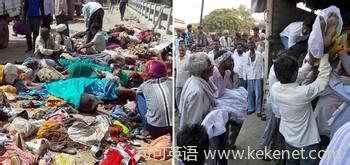Maldives aims to clean up "Rubbish Island"
改变形象 马尔代夫清理垃圾岛
The Maldives is promoted as a holiday destination with an abundance of sun, sand and sea. But there’s an environmental cost to tourism. Among the country’s pristine islands there’s also one known as Rubbish Island. Authorities are now trying to clean up its image.
Around one million tourists flock to the Maldives each year. It’s a country made up of more than one thousand pristine islands. But close to the capital Male there is one place no visitor would want to go. For 20 years Thilafushi -- or Rubbish Island -- has been the nation’s main dumping ground. It’s an eyesore but also a serious ecological threat.
"All this garbage, the most serious stuff comes from electronic waste. These things are also burned or buried with the normal waste. Here we are filling the sea, a shallow area, and this garbage is being disposed in the ocean, in liquid. So it’s very easy for the heavy metals, the chemicals like lead and all the non-biodegradables to get into the ocean, into the reef around and then into the food chain." said Ali Rilwan, Environmentalist, Bluepeace Maldives.
More than 200 tonnes of rubbish are dumped on the island every day. Most is from Male but a quarter comes from the nation’s holiday resorts. Dozens of migrant workers sift through it separating what to bury from what can be burned.
"When they dump the waste, we find all the plastic items like plastic bottles and put them to one side, then everything else we pile together and set it on fire." said Mohamed Dhula Dheen, Worker from Bangladesh.
Local authorities plan to stop toxic open burning and build a cleaner incinerator on the island. They also want to reclaim land and move from seafill to landfill. They hope better waste management in Male through door-to-door collection and recycling will further help cut damage to the environment around Thilafushi.
"The island will remain as it is because it’s an industrial island and the project that is going ahead will monitor air pollution and also the sea pollution near Thilafushi Island and so no further expansion by waste will be done for Thilafushi.
In fact, if we are reclaiming, we will be doing it in an environmentally-friendly manner." said Ahmed Kareem, City Councillor, Male City.
But political upheaval following a sudden change of government last year has meant plans for the island have stalled. As the country struggles to cope safely with waste of its own, environmentalists are encouraging tourists to take their most hazardous rubbish such as batteries home.



















